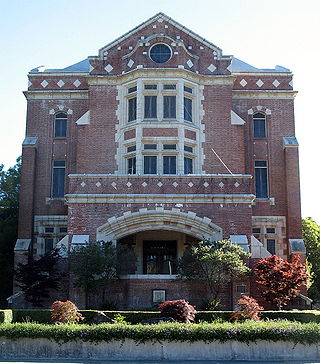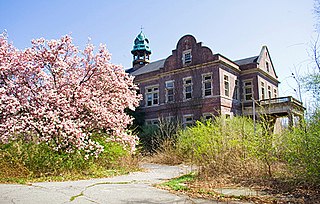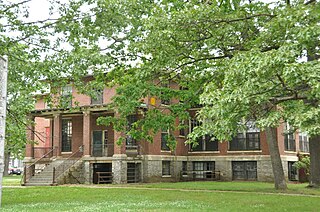
The Walter E. Fernald State School, later the Walter E. Fernald Developmental Center, was the Western hemisphere's oldest publicly funded institution serving people with developmental disabilities. Originally a Victorian sanatorium, it became a "poster child" for the American eugenics movement during the 1920s. It later was the scene of medical experiments in the 20th century. Investigations into this research led to new regulations regarding human research in children.

The Belchertown State School for the Feeble-Minded was established in 1922 in Belchertown, Massachusetts. It became known for inhumane conditions and poor treatment of its patients, and became the target of a series of lawsuits prior to its eventual closing in 1992. The building complex was listed on the National Register of Historic Places in 1994.
A group home, congregate living facility, care home, adult family home, etc., is a structured and supervised residence model that provides assisted living and medical care for those with complex health needs. Traditionally, the model has been used for children or young people who cannot live with their families or afford their own homes, people with chronic disabilities who may be adults or seniors, or people with dementia and related aged illnesses. Typically, there are no more than six residents, and there is at least one trained caregiver there 24 hours a day. In some early "model programs", a house manager, night manager, weekend activity coordinator, and four part-time skill teachers were reported. Originally, the term group home referred to homes of 8 to 16 individuals, which was a state-mandated size during deinstitutionalization. Residential nursing facilities, also included in this article, may be as large in 2015 as 100 individuals, which is no longer the case in fields such as intellectual and developmental disabilities. Depending on the severity of the condition requiring one to need to live in a group home, some clients are able to attend day programs and most clients are able to live normal lifestyles.
The Vineland Training School is a non-profit organization in Vineland, New Jersey with the mission of educating people with developmental disabilities so they can live independently. It has been a leader in research and testing.
Elwyn Inc. is a multi-state nonprofit organization based in Elwyn, Pennsylvania, in Middletown Township, Delaware County, Pennsylvania providing services for children and adults with intellectual and developmental disabilities, and behavioral health challenges. Established in 1852, it provides education, rehabilitation, employment options, child welfare services, assisted living, respite care, campus and community therapeutic residential programs, and other support for daily living. Elwyn has operations in 8 states: Pennsylvania, New Jersey, Delaware, California, Maine, Massachusetts, Rhode Island, and North Carolina.

The Sonoma Developmental Center (SDC) was a large state school in California, United States for people with developmental disabilities, and is located in Eldridge in Sonoma County. Former names for this hospital include California Home for the Care and Training of Feeble Minded Children (1883); Sonoma State Home (1909); Sonoma State Hospital (1953); and Sonoma Developmental Center starting in 1986. The center closed on 31 December 2018.

Pennhurst State School and Hospital, originally known as the Eastern Pennsylvania State Institution for the Feeble-Minded and Epileptic was a state-run institution for mentally and physically disabled individuals of Southeastern Pennsylvania located in Spring City. After 79 years of controversy, it closed on December 9, 1987.

The Rosewood Center was an institution for people with developmental disabilities located on Rosewood Lane in Owings Mills, Maryland.
The Council on Quality and Leadership offers accreditation, training, certification, research, and consultation services to agencies.

The Wrentham Developmental Center, formerly Wrentham State School, is a historic state-run medical facility for the treatment of psychiatric and developmental disorders. It is located on a large campus at the junction of Emerald and North Streets in Wrentham, Massachusetts. The school was authorized by the state in 1906, and the first phase of the campus was developed between 1909 and 1917. The school opened in 1910. The school had a typical patient population of 1,200-1,300 during the 1920s. The name was changed in the 1990s. The school campus was added to the National Register of Historic Places in 1994.

The Fairview Training Center was a state-run facility for people with developmental disabilities in Salem, Oregon, United States. Fairview was established in 1907 as the State Institution for the Feeble-Minded. The hospital opened on December 1, 1908, with 39 patients transferred from the Oregon State Hospital for the Insane. Before its closure in 2000, Fairview was administered by the Oregon Department of Human Services (DHS). DHS continued to operate the Eastern Oregon State Hospital in Pendleton until October 31, 2009.
Intermediate Care Facilities for Individuals with Intellectual Disabilities (ICF/IID), formerly known as Intermediate Care Facilities for Mental Retardation (ICF/MR), is an American Medicaid-funded institutional long-term support and service (LTSS) for people with intellectual disabilities or related conditions. Section 1905(d) of the Social Security Act enacted benefits and made funding available for "institutions" for individuals with intellectual or related conditions. According to federal law 42 CFR § 440.150 the purpose of ICD/IIDs is to "furnish health or rehabilitative services to persons with Intellectual Disability or persons with related conditions."

The Virginia State Colony for the Epileptics and Feeble Minded was a state run institution for those considered to be “Feeble minded” or those with severe mental impairment. The colony opened in 1910 near Lynchburg, Virginia, in Madison Heights with the goal of isolating those with mental disabilities and other qualities deemed unfit for reproduction away from society. The colony was the home of Carrie Buck, the subject of the landmark Supreme Court case Buck v. Bell.
The Ladd School in Exeter, Rhode Island operated from 1908 to 1993 as a state institution to serve the needs of people with mental disabilities or developmental delays. It was closed largely due to the deinstitutionalization movement of the 1980s.
As of 2017, approximately 1.4 million Americans live in a nursing home, two-thirds of whom rely on Medicaid to pay for their care. Residential nursing facilities receive Medicaid federal funding and approvals through a state health department. These facilities may be overseen by various types of state agency.

Stephen Olin Garrison (1853–1900) was a Methodist minister and scholar who developed The Probationer's Catechism for Methodist probationary members and founded The Training School in Vineland, New Jersey.

The Columbus Developmental Center (CDC) is a state-supported residential school for people with developmental disabilities, located in the Hilltop neighborhood of Columbus, Ohio. The school, founded in 1857, was the third of these programs developed by a U.S. state, after Massachusetts in 1848 and New York in 1851.
William D. Partlow Developmental Center, also known as the Partlow State School and Hospital, was a state school for people with mental disabilities, primarily intellectual and developmental disabilities in Tuscaloosa, Alabama, USA. It was operated by the Alabama Department of Mental Health. It was the last such full-sized facility operated by the State of Alabama and closed in 2011.
State schools are a type of institution for people with intellectual and developmental disabilities in the United States. These institutions are run by individual states. These state schools were and are famous for abuse and neglect. In many states, the residents were involuntary sterilized during the eugenics era. Many states have closed state schools as part of the deinstitutionalisation movement.













